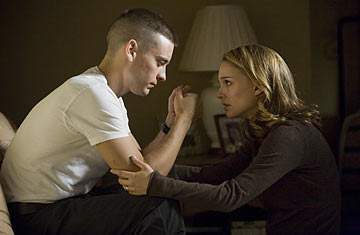
When it comes to handing out gushy blurbs for movies, David Letterman is no Larry King. Yet when Natalie Portman was a guest on his show recently, the crabby old host couldn’t stop raving about her new film Brothers. “This is the finest film made in the last 12, 20 years,” he effused, and Portman nearly ducked, as if to avoid being drenched by the torrent of praise.
Brothers isn’t up there in the empyrean of classic movies, but it is a solid drama — about a family at war with itself — that handles its combustible elements with care and gets strong, accurate performances from Tobey Maguire, Jake Gyllenhaal and Natalie Portman. The release of the film has either perfect or ominous timing, for it opens just after President Obama’s announcement that he was sending additional troops to Afghanistan. Brothers, written by David Benioff and directed by Jim Sheridan, is about a soldier sent to that perilous region, with dire results for him, his fellow Marines and the family he left behind.
(See pictures of Natalie Portman’s career.)
In October 2007, Captain Sam Cahill (Maguire) is preparing for another tour of duty, this time in Afghanistan. That leaves him just enough time to say goodbye to his loving wife Grace (Portman) and their two bright young daughters and to fetch from prison his wastrel brother Tommy (Gyllenhaal), who is at the end of his sentence for assaulting a bank teller. Shortly after arriving in Afghanistan, Sam’s plane is shot down and crashes; he and his men are believed dead, and Grace soon gets the awful news. In fact, he and another Marine have been captured by a Taliban group. They are tortured, forced to spill secrets and, at riflepoint, pushed into a life-or-death dilemma. Back home, Tommy has ingratiated himself into the Cahill home. The girls adore him, and Grace starts to see his sweet side. When, to the family’s shock, Sam comes back alive, he can feel different emotional vectors in the house. Grace and Tommy have changed. But then, so has he.
The story’s literary antecedents are ancient and plentiful. You’ll find them in the Old Testament (Cain and Abel), in medieval romance (Heloise and Abelard) and in 19th century poetry (Tennyson’s “Enoch Arden”), not to mention dozens of movies about men whose wives think they’re dead and marry someone else. All these motifs appear in the script that Anders Thomas Jensen wrote for Susanne Bier’s 2004 Danish film Brodre, of which Brothers is a nearly scene-by-scene, sometimes line-by-line, Americanization. Except for a few stunt exercises, like Gus Van Sant’s Psycho and Michael Haneke’s remake of his own Funny Games, I can’t think of a movie that so closely adheres to its original. (The new film’s only capitulation to Hollywood dogma is the way it reduced its characters’ ages from about 40 to about 30.)
Sheridan’s movie is like a reverent revival of a famous play, but one that is an improvement on the first version. Brodre is a nicely judged, finely acted film, and of course it was there first, but the new picture has a more impressive cast and a director who is sensitive to just about every nuance of character and situation. Tommy at first seems a malingering loser, blaming his situation on everyone but himself — his stern father (Sam Shepard) and even Sam, who loves him and sticks up for him — and when Sam is reported dead, Tommy typically thinks he’s the center of the tragedy. But Gyllenhaal slowly works his way out of the viewer’s suspicions; meanwhile, Portman shows us a devastated woman in need of a man to ease her solitude and warm her heart.
Maguire, in hero roles like Spidey or indie dramas like this, has always been a thoughtful, watchful actor whose giant eyes seem to be monitoring humans from outer space. Sam’s eyes see horrible things in Afghanistan, and when he comes home, he sees something even more threatening: two people in love, one of them his wife. As in some science-fiction parable, here it’s the children who sense a mutation in their daddy — to them he’s now an alien creature — a foreboding that is complicated by their growing affection for Tommy. Sheridan has shown before, especially in his semi-autobiographical In America, his gift for directing children, and he gets wonderfully complex shadings from the two girls, Bailee Madison and Taylor Geare. It’s the kids who trigger the movie’s painful denouement, in which Sam realizes that his searing guilt doesn’t fit in a home that was happy until he returned to it.
At the beginning, the film seems to suggest that good men go to war, and weak men stay home. But what it’s really saying is that the men we send to war are at risk of returning broken, diseased and damaged and that those changes can be a danger for those around them — including, and especially, the ones they love most.